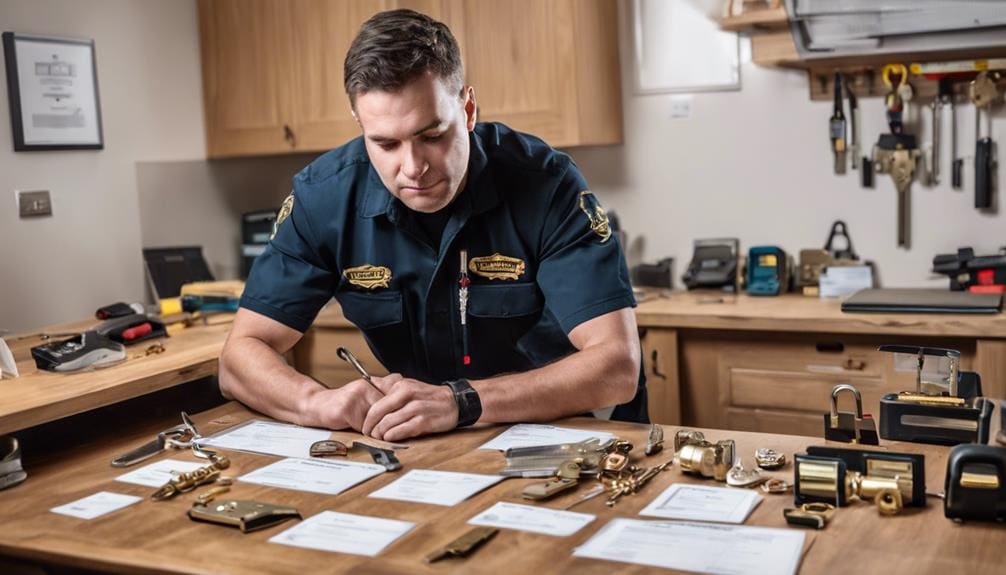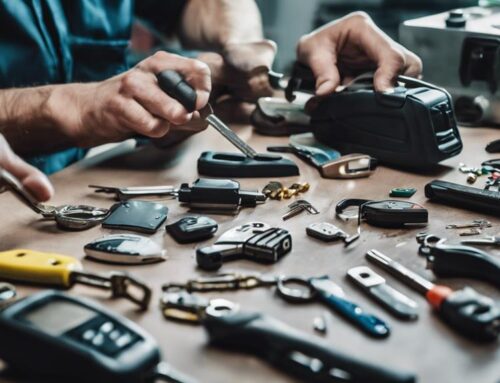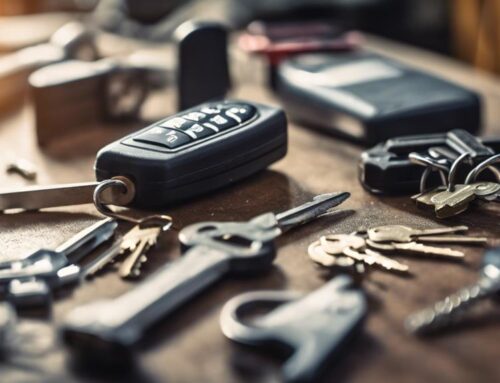Yes, locksmiths are typically licensed and insured. Licensing involves background checks, rigorous training, and exams, ensuring they meet high standards of knowledge and professionalism. Insurance provides liability coverage, protecting you from accidental property damage or other financial losses. Licensed and insured locksmiths guarantee reliable, secure, and knowledgeable services, protecting you from fraudulent and subpar work. Always verify a locksmith’s credentials by asking for their license number and proof of insurance. Trust insured and licensed professionals for your security needs—there’s more to uncover about their significance and selecting the right locksmith.
Key Takeaways
- Licensing ensures locksmiths meet industry standards and possess necessary training.
- Insurance provides financial protection against accidental property damage during service.
- Licensed locksmiths undergo background checks, specific training, and exams.
- Insured locksmiths comply with legal and ethical practices, protecting clients from unexpected costs.
- Certification guarantees professional expertise and legal compliance in locksmith services.
Licensing Requirements

When considering a career as a locksmith, understanding the licensing requirements in your state is important due to the varying regulations and prerequisites. Each state may have different rules, including background checks, specific training, and exams. To legally practice and offer security services, you’ll often need to be licensed. This guarantees you’re held to higher standards of accountability and professionalism. Many states also require continuous education to maintain your license and stay updated on industry standards. Not only does being licensed protect you, but it also reassures clients that you’re trustworthy and reliable. Additionally, while licensing is vital, you’ll also need to look into insurance and bonding to fully comply with legal and professional standards.
Insurance Coverage
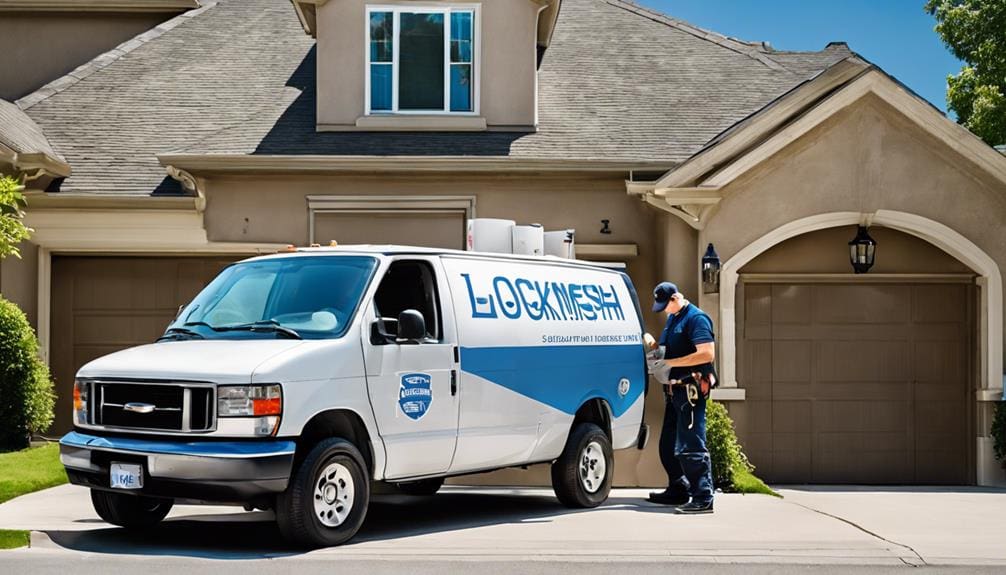
Beyond licensing, obtaining appropriate insurance coverage is a critical aspect of being a professional locksmith. When a locksmith is insured, you can trust they’ll handle your property with care, and you’re protected against unexpected costs. Locksmith insurance policies typically include liability insurance, which covers any unintentional damage that might occur during service.
Here’s why insurance coverage is essential:
- Liability insurance: Safeguards against financial loss if the locksmith accidentally damages your property.
- Unintentional damage: Guarantees any mishaps are covered, providing peace of mind for both parties.
- Bonding is similar: It adds an extra layer of security, safeguarding your finances and ensuring the locksmith fulfills their obligations.
Trust insured locksmiths to safeguard your property and finances effectively.
Why Licensing Matters
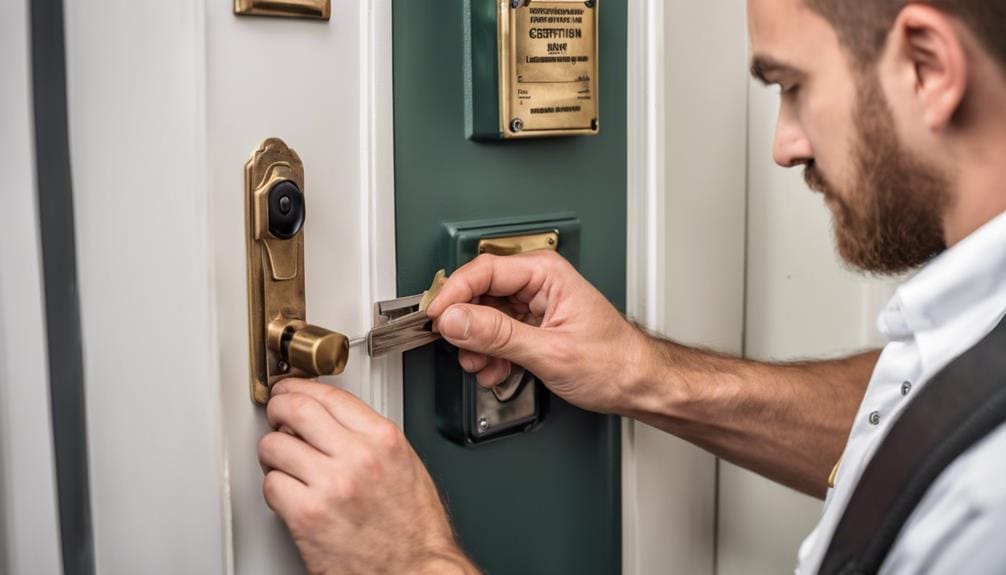
When you hire a licensed locksmith, you’re ensuring they meet industry standards and possess the necessary training. This guarantees professional expertise and legal compliance, giving you peace of mind. Choosing licensed professionals also means you’re protected against fraud and subpar workmanship.
Guarantees Professional Expertise
Certification guarantees locksmiths have undergone thorough training and comply with industry standards, providing professional expertise you can trust. When you hire a certified locksmith, you’re reassured they possess the necessary skills and knowledge to deliver reliable services. Regulatory bodies confirm these professionals follow the latest industry standards. This dedication offers more than just technical proficiency; it’s a promise of excellence. Additionally, certified locksmiths often carry insurance coverage, safeguarding you from potential liabilities. They’re also dedicated to complying with legal requirements, reducing risks of fraud or substandard work.
Here’s why certification matters:
- Thorough training and compliance with industry standards
- Insurance coverage for added protection
- Dedication to complying with legal regulations
Trust in a certified locksmith ensures peace of mind and quality service.
Ensures Legal Compliance
Choosing a certified locksmith means you’re also opting for someone who meets stringent licensing requirements, ensuring they adhere to legal standards and regulations. Licensed and insured locksmiths have completed specific training and fulfilled criteria set by regulatory bodies. This guarantees not just expert advice on your security needs but also professional service. By selecting a licensed locksmith, you’re assured of quality work and protected against fraud or substandard services. Licensing signifies a commitment to professionalism and adherence to industry best practices. It’s important for legal compliance and peace of mind, knowing the locksmith working on your property meets all necessary legal standards. Make a wise choice—select licensed and insured locksmiths for reliable and lawful service.
Risks of Unlicensed Locksmiths
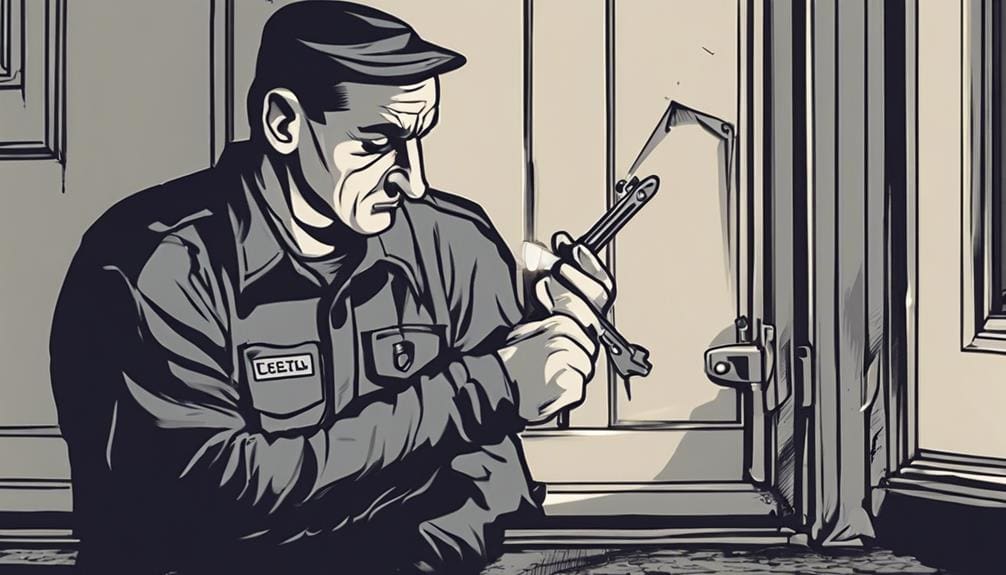
When you hire an unlicensed locksmith, you’re taking a significant risk due to their lack of proper training. This inexperience can lead to compromised security measures and potential property damage. Only licensed professionals have the expertise to guarantee your property remains secure.
Lack of Proper Training
Unregistered locksmiths often lack the essential training in security systems, putting your safety at risk by providing misguided advice and substandard services. Without proper training, they may not have the necessary skills to address your security needs effectively. Licensed locksmiths, on the other hand, undergo rigorous training to make sure they can offer reliable security solutions.
Here are three risks associated with unregistered locksmiths:
- Inadequate Security Knowledge: They may lack the training to understand modern security systems.
- Subpar Workmanship: Their lack of formal training can lead to poor-quality work, compromising your safety.
- Misguided Advice: Unregistered locksmiths might provide incorrect recommendations, endangering your security.
Choosing a licensed locksmith ensures you receive professional, knowledgeable, and trustworthy service.
Potential Security Risks
Hiring unregistered locksmiths exposes you to significant security risks due to their lack of experience and liability coverage. Unlicensed locksmiths often lack the necessary training and professionalism, which can lead to misguided advice and compromised security measures. Without liability insurance, any property damage they cause falls on you. To safeguard your safety and get reliable security solutions, always hire a licensed locksmith. Licensed professionals undergo background checks and provide fingerprint information, offering credibility and peace of mind. They’re insured and well-versed in the latest security systems, guaranteeing your property remains secure. Don’t gamble with your safety—choose a locksmith who’s both licensed and insured. Your security deserves nothing less.
Benefits of Insured Locksmiths

Opting for an insured locksmith means you’re protected against potential damages and liabilities during service. When you choose someone with insurance, you’re ensuring that coverage safeguards your property and any affected individuals. This highlights a commitment to compliance with legal and ethical practices, as insured locksmiths adhere to necessary regulations and standards.
Here are the benefits of hiring an insured locksmith:
- Peace of Mind: Clients are safeguarded from unexpected costs due to property damage or injuries.
- Quality Assurance: Insured locksmiths prioritize safety and quality, reflecting their investment in continuing education.
- Reliable Service: Knowing that they’re covered, insured locksmiths can focus on delivering exceptional service without cutting corners.
Hiring an insured locksmith is a smart choice for dependable and secure assistance.
Importance of Bonding

Bonding guarantees that clients are protected against unforeseen damages or accidents during locksmith services. When you hire a bonded locksmith, you’re choosing someone who has undergone thorough background checks, ensuring your safety and peace of mind. Bonding acts as a safety net, promising reimbursement for any unintended property damage, which provides a layer of financial security. Locksmiths pay a bonding company to become bonded, enhancing their reliability and trustworthiness. Industry organizations, like ALOA, offer bonding options to locksmiths to boost client confidence. By opting for a bonded locksmith, you’re ensuring that any mishaps during the service won’t result in out-of-pocket expenses, making it a wise and secure choice for your locksmithing needs.
How to Verify Credentials
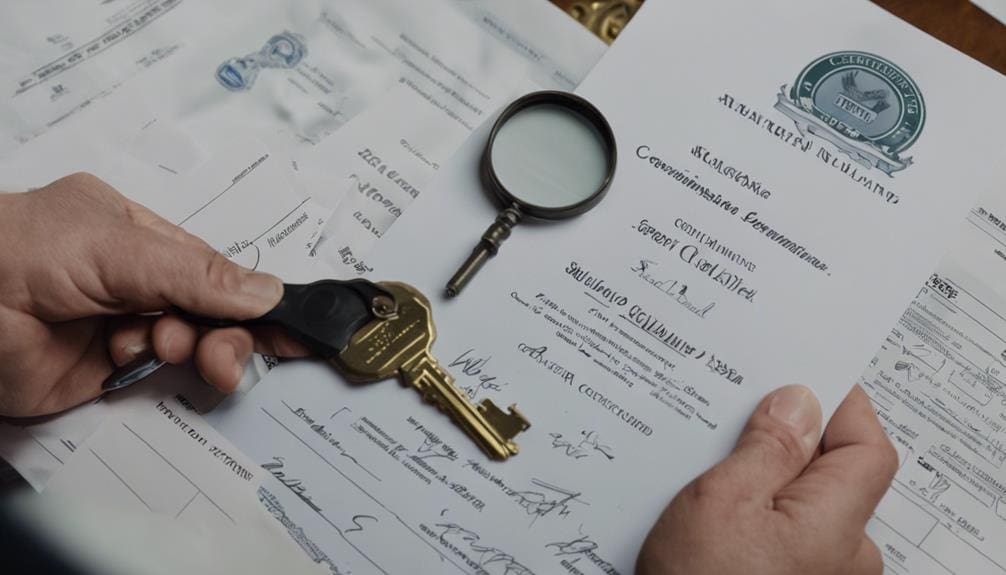
To confirm a locksmith’s credentials, ask for their license number and check it with the relevant licensing authority. Validate they are insured locksmiths by requesting proof of liability insurance. This guarantees you’re protected against accidental damages. Additionally, check if they are bonded through a bonding company, offering extra financial protection.
Here’s how you can verify credentials:
- License Verification: Ask for the locksmith’s license number and validate it with the licensing authority.
- Insurance Confirmation: Request proof of liability insurance to confirm the locksmith has protocols in place for coverage.
- Bonding Status: Guarantee the locksmith is bonded by asking for documentation from a bonding company.
Taking these steps minimizes risks and assures you hire a qualified professional.
Low Rate Locksmith’s Standards
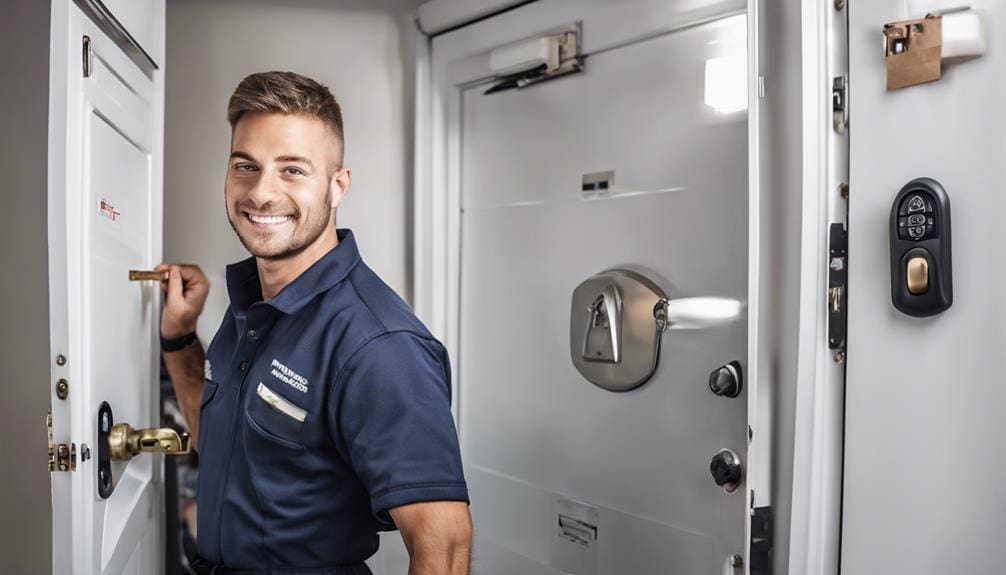
Low Rate Locksmiths consistently uphold stringent standards of licensing and insurance to guarantee you receive high-quality service. Locksmiths must be licensed professionals with proper certification to make sure they meet industry standards. Low Rate Locksmiths understand that clients often require assurance that their property is in safe hands, which is why they carry liability insurance similar to insurance policies in other professions. This coverage protects you and your property during any locksmith service. Adhering to these strict standards makes certain that every locksmith from Low Rate Locksmiths is reliable and trustworthy. You can confidently rely on their services, knowing that they are both licensed and insured, committed to delivering the best in the industry.
Frequently Asked Questions
Does Texas Require a Locksmith License?
Imagine you’re a locksmith in the Wild West! In Texas, you don’t need a state-issued license to practice. However, some local jurisdictions might have their own requirements, so it’s essential to check with local authorities. Although licensing isn’t mandatory, you can pursue voluntary certification through organizations like ALOA. Stay informed about any changes in licensing regulations to make sure you’re always ready to serve your community effectively.
Does Florida Require a Locksmith License?
Yes, Florida mandates locksmiths to be licensed. You need to go through the Florida Department of Agriculture and Consumer Services. This process includes passing a background check and showing proof of liability insurance. Once licensed, you’ll receive an identification card with a unique number. Operating without a license can lead to fines and legal trouble. Hiring a licensed locksmith in Florida guarantees you’re receiving professional and reliable service.
Do You Need a License to Be a Locksmith in Ny?
Yes, you need a license to be a locksmith in NY. Unlike some states, New York mandates that locksmiths get licensed through the Department of State’s Division of Licensing Services. This guarantees you’ve met specific training and competency standards, passed a background check, and gained necessary experience. Licensing guarantees you operate ethically and professionally, protecting consumers and upholding trust in your vital role in community safety.
How Do Locksmiths Verify Ownership of a Safe?
To confirm ownership of a safe, locksmiths will ask for valid identification and proof of ownership documents from you. They’ll often check security codes, serial numbers, or personal information related to the safe. Reputable locksmiths strictly follow these protocols to guarantee they’re granting access only to the rightful owner. This approach prevents unauthorized access and upholds legal and ethical standards, safeguarding everyone’s safety and trust.

